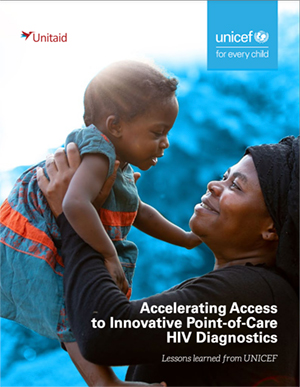This document was developed to compile knowledge, insights and recommendations from UNICEF focal points in country offices implementing a project aimed at introducing, scaling up, and integrating point-of-care (POC) diagnostics into national health systems.The project was implemented by UNICEF, CHAI and ASLM with funding from Unitaid in 10 sub-Saharan African countries between 2016-2020. As the project was winding down, we thought it was important to document the lessons learned from those with direct, hands-on experience in project implementation to offer guidance to other countries interested in adopting POC technologies to increase access to diagnostics.
Innovative POC diagnostics can be a game changer in health systems as it enables testing outside the laboratory and closer to patients, can be used for the diagnosis of multiple diseases, addresses key limitations of conventional laboratory networks, and significantly increases access to diagnostic testing in a decentralized fashion. Decentralization of testing also carries an additional benefit as it strengthens elements of the health system around diagnostics (e.g., supply chain management, quality management, connectivity and data management, waste management) that have a broader impact on the health system. The multi-disease testing capacity of POC devices also contributes to pandemic preparedness and response, as has been shown by its use in the Ebola outbreak in West Africa (2014-2016) as well as its widespread use during the COVID-19 pandemic.
The impact of POC diagnostic technologies cannot be overstated. This is particularly important in communities in low-resource settings with limited access to diagnostics as well as patients whose clinical management depends upon quick diagnostic test results – such as children infected with HIV. Without treatment, up to 50 per cent of children living with HIV die by their second birthday, with a peak mortality between two and three months of age. Thus, HIV-exposed infants need to be diagnosed before two months of age using molecular diagnostic methods until recently only available in conventional laboratories. However, such conventional laboratory systems carry inherent limitations that restrict their ability to provide timely results in various settings, particularly low-resource settings. It was this urgent need to diagnose HIV-positive infants and initiate them on treatment as soon as possible that motivated this project. POC diagnostics introduction and scale up allowed faster diagnosis, which in turn increased the number of HIV-infected children diagnosed and initiated on treatment within two months of age.
Although the project was focused on increasing access to early infant diagnosis of HIV through POC testing, it also demonstrated the cost-effectiveness of POC diagnostics and the benefits of multi-disease testing by integrating HIV viral load and TB testing on the same POC diagnostic platforms. In spite of the focus on HIV, the lessons reported here are broadly relevant for other disease programmes. These lessons are organized in seven main topics: (1) Leadership commitment and support; (2) Laboratories and the supply chain; (3) Engagement with civil society organizations(CSOs); (4) Diagnostics network optimization (DNO); (5) Innovative approaches; (6) Transition to national governments and other long-term funding partners; and (7) Grant design and management. These lessons build upon the 'Key Considerations for Introducing New HIV Point-of-Care Diagnostic Technologies in National Health Systems' published in 2017, and 'Lessons Learned from Integrating Point-of-Care testing Technologies for Early Infant Diagnosis of HIV into National Diagnostic Networks' published by the Elizabeth Glaser Pediatric AIDS Foundation (EGPAF) in 2019. Together, these resources offer a comprehensive perspective on the strategies, challenges, and lessons learned in the course of integrating POC diagnostics into national health systems that countries should consider when introducing and/or scaling up POC diagnostics.

